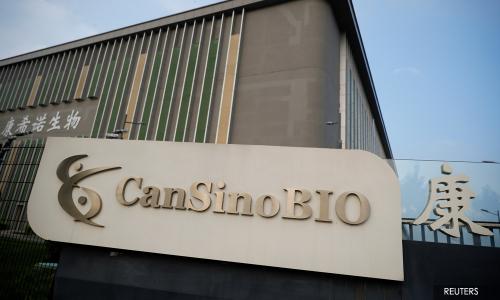CanSinoBio's Covid booster stronger against BA.1 Omicron than Sinovac shot
Chinese vaccine firm CanSino Biologic's inhalation-based candidate elicited a better antibody response as a booster against the BA.1 Omicron sub-variant than Sinovac's shot, but the antibody level dropped in months, clinical trial data showed.
The result came as top political leaders in China called for proper tracking of virus mutation and the development of new vaccines and treatments in the country's effort to refine its Covid control strategy.
China has given about 56 percent of its 1.41 billion population a booster dose using domestic shots, and most people were boosted with the same product as their primary series, despite growing evidence that some mix-and-max strategies would likely achieve higher antibody levels.
Among over 100 adults who received a lower dose of CanSinoBio's inhaled vaccine candidate following two Sinovac shots, after four weeks, 92.5 percent developed the neutralising antibody that neutralises Omicron at levels that researchers defined as detectable, according to a paper published without peer review.
That compared with 88.9 percent for a higher-dose group, also with over 100 participants, said in a paper published late on Thursday.
The rate for both groups declined to around 70 percent after six months of the inhaled booster.
Barely any of the over 100 participants who received a third Sinovac shot had detectable neutralising antibody for Omicron after four weeks or six months.
The study did not compare CanSinoBio's inhaled booster with other potential boosters that have triggered stronger antibody responses than a third dose of the Sinopharm or Sinovac shot.
Antibody-based readings reflect an important part of the vaccine-triggered immune response and are different from the vaccine efficacy that indicates how well a shot reduces the risk of Covid disease, hospitalization or death.
The impact of BA.4 and BA.5 Omicron sub-variants on CanSinoBio's inhaled vaccine deserves further study, said the authors, who worked at CanSinoBio and other Chinese institutes.
CanSinoBio's experimental inhaled vaccine uses a technology similar to that of its injection-based shot, which has been approved in countries including China, Mexico and Argentina, and AstraZeneca's vaccine.
The company is also testing a candidate based on the mRNA method in a mid-stage clinical trial in China.
- Reuters
RM12.50 / month
- Unlimited access to award-winning journalism
- Comment and share your opinions on all our articles
- Gift interesting stories to your friends
- Tax deductable

